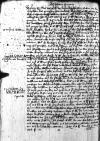Das uns Ewer Herlichkeit abermals durch ihr ⌊⌋ / wegen unser swacheit ersuchenn, / und sich frewen, das die zu besserung (: Got lob :) sich wendet, / thu wir uns deshalben, / wie auch zuvor von uns geschenn, / freuntlich bodanckenn. Und seindt ihn der zuvorsicht, die wir zu Got dem almechtigen [un]ser gesuntheit halben haben, / in vorigem freitage von ⌊Vormdith⌋ hieher in unser fuerwerck ⌊Smolein⌋ vorruckt, / da wir dennoch mudickeit halbenn bass in den vierden tag uns widderum auszuruhen / haben vorharren mussenn, / und seindt bodocht mit gotlicher hulffe morgen uns ferner noch ⌊Heilsberg⌋ zubegebenn, wo uns auf zukomende ⌊tagfarth⌋, / die wir von ⌊koninglicher majestet⌋, unserem allergnedigsten hernn, kegen ⌊Elbing⌋ auf sanct Barbare feir, welchs sein wirdt der vierdte Decembris, / im namen aller hern ⌊dieser lande⌋ ⌊redte⌋ / anzusatzenn gebeten, / volkommen ausruhen und unser gesuntheit zu erholen . Wo uns nu / der almechtige Got genedigst die starcke und kraft , / darin wir nicht zweifeln, / vorleien wirdt, / das wir uns genugsam zu dem wege spuren , / wollen wir nicht die ⌊tagfarth⌋ allein der gemeinen ⌊dieser lande⌋ hendel halben, / die sher reichlich und swer seindt, / auch wises rats bodurrffen, / sunder das wir uns auch mit Ewer Herlichkeit shen mochtenn, / gerne bosuchenn. Ess wil aber nu vortmher unser swacher, abgewiseter leib, / den wir zu wasser und lande / in vielen und sweren gescheften und hendeln bisher gebrauchet, / und derwegen wenig ruhe gehabt, / nicht mehr die bowegung des reisens und fharens austhen, / und wo wir densulben noch ein zeitlang erhalten wollen, / werden wir uns des enthaltenn und darin messigenn mussen. Das Ewer Herlichkeit auf unser bitte auch ihrer gesuntheit mer vorthin wil war nhemen / und der warten, hat uns sunderlich wolgefallenn, / den wie volkommen wir uns sulbst die gunnen, / thun wir die auch Ewer Herlichkeit von Gote lange zeit wunschen. ⌊Absolonn Reinmans⌋ schreibenn und das meister der bohemischen hern, so sich widder die ⌊romische koningliche majestet⌋ ihrem eidt entkegen vorbunden, / welchs Ewer Herlichkeit durch ihren ⌊son⌋ von ⌊Praga⌋ ist zugefertigt, haben wir gerne gelesenn. / Bodanckenn uns kegen Ewer Herlichkeit, das die uns solchs hat mitgeteilet. / Sendt unsers boten, / den wir an ⌊alter koninglicher majestet⌋ hof geschicket, / teglich vormuttende. / Was der von der ⌊tagfarth⌋ hie im ⌊lande⌋ / und sunst anderen zeitungenn uns wirdt einbringenn, / wollen wir Ewer Herlichkeit, / die der almechtige Got lange gesunt erhalte, / mitzuteilen nicht nachlassen.

